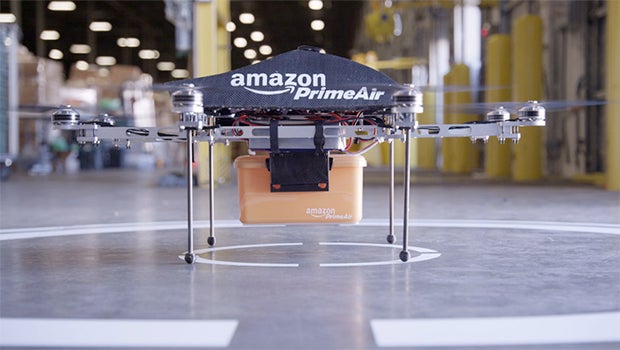Amazon is no longer testing the drone it was finally approved to test

Amazon was finally granted permission to begin testing its delivery drones on home soil last week… the trouble is US regulators took so long to give the OK, the unmanned aircraft in question is now obsolete.
In a statement to a Senate subcommittee in the United States on Tuesday (via The Verge), Amazon slammed the Federal Aviation Administration for its draconian attitudes towards the firm’s Prime Air drone delivery initiative.
Amazon’s VP for Global Public Policy Paul Misener said, while the FAA has been dragging its heels and hindering Amazon’s plans, the firm has been busy testing Air Prime abroad, where regulations are less stringent.
He said: “This approval came last Thursday, and we’re eager to get flying here as we have been abroad.”
However, Misener added, “while the FAA was considering our applications for testing, we innovated so rapidly that the [drone] approved last week by the FAA has become obsolete. We don’t test it anymore. We’ve moved on to more advanced designs that we already are testing abroad.”
Sadly for Amazon, as it was only granted permission to test one particular model, last week’s approval is rendered practically useless beyond moral victory status.
Read more: Amazon Fire TV stick comes to the UK
Misener continued to criticise the FAA, claiming Amazon has been forced to wait no longer than two months to begin testing when requesting permission in other countries.
However, the new FAA rules require Amazon to maintain line-of-sight contact with drones, while every employee in charge of flying the devices must require a valid pilot’s license and medical certificate.
Amazon maintains the new rules make it difficult to envision such a vision becoming a reality on home soil.
Misener said: “Nowhere outside of the United States have we been required to wait more than one or two months to begin testing, and permission has been granted for operating a category of UAS, giving us room to experiment and rapidly perfect designs without being required to continually obtain new approvals for specific UAS vehicles.”
“We are grateful for the FAA’s newly released [rules], so far as it goes. But it doesn’t go far enough,” said Misener. “Unlike the planning by the national and multinational groups with whom I met in Europe earlier this month, the FAA is not adequately addressing compelling UAS applications that involve highly automated operations beyond visual line of sight.”


